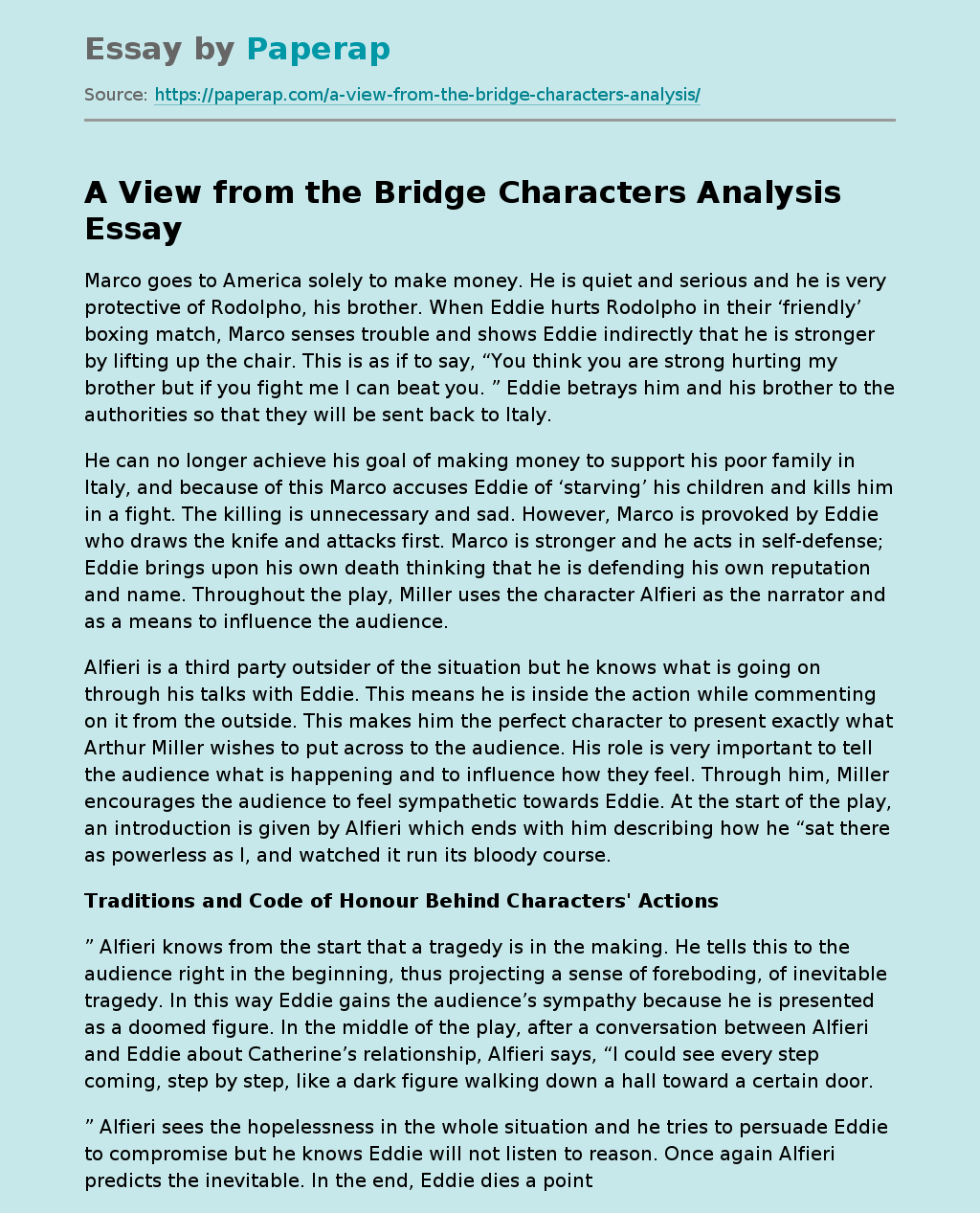A View from the Bridge Characters Analysis
Marco goes to America solely to make money. He is quiet and serious and he is very protective of Rodolpho, his brother. When Eddie hurts Rodolpho in their ‘friendly’ boxing match, Marco senses trouble and shows Eddie indirectly that he is stronger by lifting up the chair. This is as if to say, “You think you are strong hurting my brother but if you fight me I can beat you. ” Eddie betrays him and his brother to the authorities so that they will be sent back to Italy.
He can no longer achieve his goal of making money to support his poor family in Italy, and because of this Marco accuses Eddie of ‘starving’ his children and kills him in a fight. The killing is unnecessary and sad. However, Marco is provoked by Eddie who draws the knife and attacks first. Marco is stronger and he acts in self-defense; Eddie brings upon his own death thinking that he is defending his own reputation and name.
Throughout the play, Miller uses the character Alfieri as the narrator and as a means to influence the audience.
Alfieri is a third party outsider of the situation but he knows what is going on through his talks with Eddie. This means he is inside the action while commenting on it from the outside. This makes him the perfect character to present exactly what Arthur Miller wishes to put across to the audience. His role is very important to tell the audience what is happening and to influence how they feel.
Through him, Miller encourages the audience to feel sympathetic towards Eddie. At the start of the play, an introduction is given by Alfieri which ends with him describing how he “sat there as powerless as I, and watched it run its bloody course.
Traditions and Code of Honour Behind Characters’ Actions
” Alfieri knows from the start that a tragedy is in the making. He tells this to the audience right in the beginning, thus projecting a sense of foreboding, of inevitable tragedy. In this way Eddie gains the audience’s sympathy because he is presented as a doomed figure. In the middle of the play, after a conversation between Alfieri and Eddie about Catherine’s relationship, Alfieri says, “I could see every step coming, step by step, like a dark figure walking down a hall toward a certain door.
” Alfieri sees the hopelessness in the whole situation and he tries to persuade Eddie to compromise but he knows Eddie will not listen to reason. Once again Alfieri predicts the inevitable. In the end, Eddie dies a pointless death not realizing that his stubbornness has caused his own demise. The tragedy is avoidable if Eddie is willing to “settle for half”; yet it is inevitable because of the community he lives in and their own traditional beliefs. The people around him are not ‘normal law-abiding Americans’.
They are a community of Italian immigrants bringing from Italy with them their virtues, beliefs and ways of life. Justice is not dealed out by the law. Rather it is taken into the citizen’s own hands to do as they think right. Eddie betrays his own people therefore breaking the code of his own community; yet he tries to defend his own name which leads to the fight and his own death. However, Miller encourages the audience to feel sympathy for Eddie. After Eddie dies, Alfieri says, “I know how wrong he was, and his death useless,” but, “something perversely pure calls me to his memory”.
He expresses his sympathy towards Eddie pointing out that, although Eddie was very wrong, he died for his name and he died for honor. Alfieri reminds the audience that Eddie was not in the right but he was true to himself – “not purely good, but himself purely”. Due to this Alfieri respects him and “mourns” him but “with a certain alarm. ” Right till the end, Arthur Miller uses Alfieri to influence the audience to feel sympathy for Eddie. In the end however, I felt most sympathy towards Beatrice. Throughout the play she is neglected by all the other characters especially her husband.
All the while watching Eddie and Rodolpho fighting over Catherine. She feels jealous but not angry and tries to persuade Eddie to let Catherine go. She wants Catherine to be happy and encourages Catherine to go away with Rodolpho. She is constantly trying to ease the tension and she tries to resolve arguments between all the characters because she wants to do what is best for everyone. Unfortunately, despite her efforts, she watches her family fall apart and the death of her beloved husband, who dies in her arms saying, “My B.! ” Perhaps, Eddie finally realizes too late what he really has to lose.
A View from the Bridge Characters Analysis. (2019, Dec 05). Retrieved from https://paperap.com/a-view-from-the-bridge-characters-analysis/

